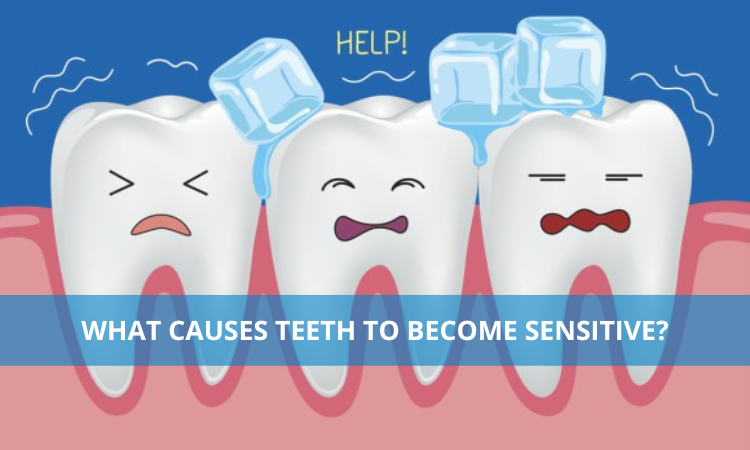
Tooth sensitivity is a common dental issue, but it can be effectively managed with the right care. Learn about the causes of sensitivity and how to find relief. Talk to your dentist about treatment options.
A widespread dental condition that affects millions of people worldwide is tooth sensitivity. It can be characterized as a quick, intense pain or discomfort that is brought on by meals and beverages that are hot, cold, sweet, or acidic. Occasionally, discomfort might be felt just from breathing in the chilly air. Even though tooth sensitivity is usually not a significant problem, it can nonetheless be uncomfortable and painful, making it difficult for people to enjoy their favourite meals and beverages.
Causes of Tooth Sensitivity:
Eroded Tooth Enamel: The enamel, the hard outer coating of the teeth, is in charge of shielding the inner layers of the teeth. This enamel may dissolve over time due to several things, including brushing too vigorously, consuming acidic foods and beverages, or simply growing older. Sensitivity and pain result from the enamel's erosion, which reveals the dentin, the softer layer beneath it.
· Gum disease: This gum infection can cause the gum tissue to recede, exposing the teeth's roots and increasing discomfort.
· Teeth Grinding (Bruxism): This practice of clenching or grinding the teeth can place undue stress on the enamel, causing gradual wear and tear and eventual sensitivity. Stress, sleep difficulties, or crooked teeth can all contribute to teeth grinding.
· Dental Procedures: Having fillings, crowns, or root canal therapy may temporarily increase sensitivity, although this normally goes away within a few days.
· Tooth Whitening Products: While these items can help you smile brighter, some of them may temporarily make some people sensitive.
Managing Tooth Sensitivity:
The best way to avoid sensitivity is to practice good mouth hygiene, avoid acidic foods and beverages, and engage in stress-relieving activities to avoid bruxism. Additionally crucial are routine dental examinations, which can aid in locating and treating any underlying problems that might be causing discomfort.
Your dentist may suggest different therapies if you are already sensitive, such as fluoride gels, desensitizing toothpaste, or specially designed mouthguards. Desensitizing toothpaste can help block the pain signals from hot, cold, sweet, or acidic meals and beverages. Fluoride gels can help build the enamel, making it less sensitive. Additionally, mouthguards that are made to order might lessen sensitivity and bruxism.
A dental procedure might be required to address the root problem in extreme circumstances. For instance, a deep cleaning procedure known as scaling and root planing may be required to remove the infected gum tissue and encourage healing if gum disease is the cause of sensitivity. When dental surgery is required, your dentist will go over your options with you and assist you in making the best decision.
Conclusion:
Although tooth sensitivity can be uncomfortable and unpleasant, it can be effectively controlled with the correct care and attention. It's crucial to discuss the best course of action with your dentist if you notice sensitivity. With the right care and attention, you can bid farewell to sensitive teeth and comfortably consume all of your favourite foods and beverages.

Dr Amna Bilal
The author is a contributing writer at Dental News Pakistan and can be reached at amna0795@yahoo.com

